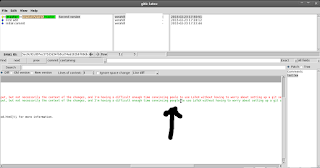I have a student who is currently preparing a thesis, and while I've managed to give most of my feedback via the pdf annotation function in mendeley, it doesn't feel natural when it should be a simple matter of editing the .tex directly (yet in a way that leaves the student in control over whether to accept or reject the changes).
So here's an exploration of three different ways of passing comments and corrections back and forth when using LaTeX.
I'm also not the first one to ask this question. See e.g. http://tex.stackexchange.com/questions/3653/what-is-the-best-way-to-track-changes-with-non-computer-people
1. Make a pdf and annotate it
This is a simple and straightforward method for passing comments back and forth. It is not a very convenient method for making any substantial changes though. On top of that, linux does not currently have any particularly useful program for annotating pdf files. See here: http://verahill.blogspot.com.au/2013/02/338-annotating-pdfs-in-linux-revisited.html for more information.
Quite apart from the lack of tool, I really want to emphasize that making small annotations is not a replacement for a tool that allows you to really stir up the text.
2. Using git
You can easily set up your own git server and use that for versioning. http://verahill.blogspot.com.au/2013/01/324-setting-up-private-git-server.html
You can see the version differences using a couple of methods, but gitk might be the easiest one. The downside with this is that you lose some of the context of the changes. Also, it shows you the code that was changed, the changes in the final document (e.g. formatting, figures etc.).
Still it's a pretty intuitive and easy way of tracking changes -- and in terms of versioning it is certainly the best solution. You can fork, roll back and generally have a perfect account of how the document has evolved.
 |
| git in particular makes it easy to see added code |
 |
| In terms of small changes like fixing typos it is a lot more subtle though |
3. latexdiff
latexdiff is an easy to use tool that's in the debian repos. Simply do
latexdiff version1.tex version2.tex > diff.tex
and then open diff.tex and compile it to see the changes.
 |
| Pleasantly suprised |
there are plenty of solutions for introducing mark-up directly into the tex document, like trackchanges, changes etc. I've used them in the past but it lack elegance when doing heavier collaborative writing.
Thoughts
I can't help but think that the best solution is to combine git with latexdiff -- or even a special fork of git that uses latexdiff.
Googling shows that apparently I"m not the only one who thinks so: http://gitorious.org/git-latexdiff#more as well as http://tex.stackexchange.com/questions/1325/using-latexdiff-with-git
I haven't actually tested any of those methods yet, and it still more or less requires a common git server.

